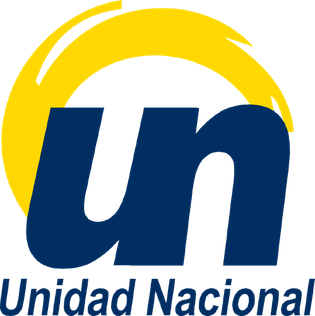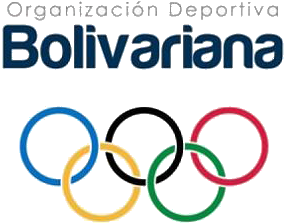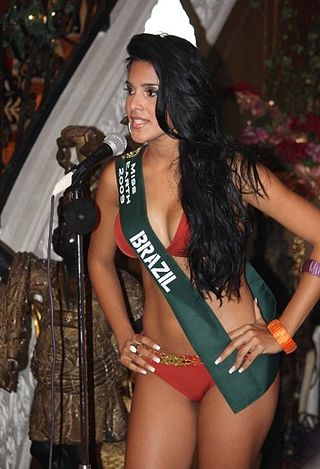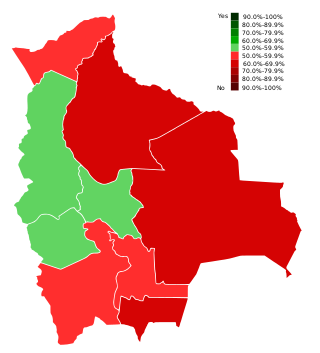Related Research Articles

The politics of Bolivia takes place in a framework of a presidential representative democratic republic, whereby the president is head of state, head of government and head of a diverse multi-party system. Executive power is exercised by the government. Legislative power is vested in both the government and the two chambers of parliament. Both the Judiciary and the electoral branch are independent of the executive and the legislature. After the 2014 Bolivian general election, 53.1% of the seats in national parliament were held by women, a higher proportion of women than that of the population.
The Fearless Movement is a defunct progressive political party in Bolivia. MSM was founded on March 1, 1999 and dissolved following the 2014 Bolivian general election.

Erreway is an Argentine pop rock band formed during the television series Rebelde Way, consisting of Camila Bordonaba, Felipe Colombo, Luisana Lopilato and Benjamín Rojas. Releasing three studio albums — Señales, Tiempo, Memoria and Vuelvo — Erreway sold 1 million records and achieved several Platinum and Gold album certifications in Argentina.

The National Unity Front is a political party in Bolivia. It was founded in late 2003 by Samuel Jorge Doria Medina Auza, who had broken with the Revolutionary Left Movement earlier that year. It has 36 members of the Chamber of Deputies in the Plurinational Legislative Assembly. Despite its substantial share of the urban vote, and 16 former mayors, it does not control any city halls or governorships. The party is closely identified with Doria Medina's cement company Sociedad Boliviana de Cemento (Soboce).

The Bolivarian Games are a regional multi-sport event held in honor of Simón Bolívar, and organized by the Bolivarian Sports Organization. The event is open to athletes from Bolivia, Colombia, Ecuador, Panama, Peru, and Venezuela. In 2010, the ODEBO decided to include Chile as the seventh member of ODEBO. Except Panama, all other participating countries are Andean states.

Jesus Aldo de Nigris Guajardo is a Mexican former professional footballer who played as a striker, who is the current assistant manager of Liga MX club Monterrey.
The Miss Bolivia is a national beauty pageant in Bolivia. The pageant was founded in 1930, and the first winner, Rosa Pizarro Araoz of Tarija, was sent to compete in Miss Latin America held in Miami, United States.

General elections were held in Bolivia on December 6, 2009, following a constitutional referendum held on 25 January 2009. The election was initially expected to be held in 2010. Voters elected:

Miss Earth 2009, the 9th edition of the Miss Earth pageant, was held on November 22, 2009 at the Boracay Ecovillage Resort and Convention Center in Boracay, Malay, Aklan, Philippines. Karla Henry of Philippines crowned her successor Larissa Ramos of Brazil at the end of the event.

Isiboro Sécure National Park and Indigenous Territory is a protected area and Native Community Land in Bolivia situated between the north of the Cochabamba Department and the south of the Beni Department. It protects part of the Bolivian Yungas ecoregion. The indigenous people living within the park belong to the Tsimané, Yuracaré, and Mojeño-Trinitario peoples. The southern portion of the park has been colonized by agricultural settlers, primarily coca farmers, since the 1970s. The Bolivian government estimates that 10% of the park has been deforested by their presence.

Punata Municipality is the first municipal section of the Punata Province in the Cochabamba Department, Bolivia. Its capital is Punata. At the time of census 2001 the municipality had 26,140 inhabitants.

Colombia has participated in all editions of the Pan American games since its inception in 1951, except in 1959 and 1963. Hurdler Jaime Aparicio Rodewaldt won the country's first medal at the inaugural edition of the games in Buenos Aires 1951, a gold medal at the 400 m hurdles. The country is ranked seventh in the all-time Pan American games medal table. Cali, the capital of the Colombian department of Valle del Cauca, held the 1971 Pan American Games, and to date, the only time Colombia hosted the games. Its best performance was at the 2019 Edition in Lima, where it earned 28 golden medals, however, their best rank was at Toronto 2015 ranking fifth. The nation has won a total of 136 golden medals, and 568 overall, with weightlifting, roller skating, and cycling as the most successful sports.
The first Bolivian judicial election was held on 16 October 2011. The national vote was held to elect magistrates to serve on the Supreme Court of Justice, the Plurinational Constitutional Court, the Agro-environmental Court and members of the Judiciary Council. It was originally scheduled to be held on 5 December 2010, but officials of the National Electoral Court and of the MAS majority in the Plurinational Legislative Assembly delayed it. The vote will be the first time that a Latin American country directly elects its highest judicial officials.

The Presidency of Evo Morales began on January 22, 2006 when Evo Morales was inaugurated as the 80th President of Bolivia, following his victory in the 2005 general election, where he won 53.7% of the vote, defeating Jorge Quiroga, Samuel Doria Medina, and several other candidates. Morales increased taxation on the hydrocarbon industry to bolster social spending, emphasising projects to combat illiteracy, poverty, racism, and sexism. Vocally criticizing neoliberalism and reducing Bolivia's dependence on the World Bank and International Monetary Fund, his administration oversaw strong economic growth while following a policy termed "Evonomics" which sought to move from a liberal economic approach to a mixed economy. Scaling back U.S. influence in the country, he built relationships with leftist governments in the Latin American pink tide and signed Bolivia into the Bolivarian Alliance for the Americas. Attempting to moderate the left-indigenous activist community, his administration also opposed the right-wing autonomist demands of Bolivia's eastern provinces. Winning a recall referendum in 2008, he instituted a new constitution that established Bolivia as a plurinational state and was re-elected in 2009. His second term witnessed the continuation of leftist policies and Bolivia's joining of the Bank of the South and Community of Latin American and Caribbean States; he was again reelected in the 2014 general election. Following the disputed 2019 general election and the ensuing unrest, Morales resigned and flew to Mexico where he had been granted political asylum.
María Olivia Pinheiro Menacho is a Bolivian beauty pageant titleholder and model who was crowned Miss Bolivia 2010, and would have represented her country in the 2011 Miss Universe pageant. Pinheiro declined to participate in the international competition after rumors about her real age were revealed to the press.

Edmundo Novillo Aguilar is a Bolivian lawyer, politician, and Governor of Cochabamba. His political career includes serving on the Departmental Council, as Mayor of Totora, and as a Deputy in the Bolivian Chamber of Deputies. He was Presidents of the Chamber of Deputies for four years from 2006 to 2010. He is affiliated with the Movement for Socialism (MAS-IPSP), and was the first MAS-IPSP member to serve a President of the Chamber of Deputies.
The 2011 Bolivian special municipal elections were held on 18 December 2011. These elections cover three of five municipalities currently without elected mayors in Bolivia: Sucre, Quillacollo, and Pazña. Elections for the Mayor of Punata will be held 29 April or 6 May 2012. Newly elected mayors will receive their credentials from the Supreme Electoral Tribunal on 27 January 2011, after which they may be sworn in.

The 2015 Bolivian regional elections were held on 29 March 2015. Departmental and municipal authorities were elected by an electorate of approximately 6 million people.

The 2010–2015 Plurinational Legislative Assembly of Bolivia was the first class of the Bolivian legislature, also known as the Plurinational Legislative Assembly, to go by that name. The Assembly was controlled in both houses by the governing Movement for Socialism (MAS-IPSP), elected with a 2/3 supermajority, although some members later separated themselves from the majority. Just four incumbent members of the 2005–2010 Congress returned: Deputy Antonio Franco; Deputy Javier Zabaleta (MAS-IPSP/MSM); Senator René Martínez (MAS-IPSP), who was a deputy; and Senator Róger Pinto, previously of Podemos and now representing PPB-CN.

A constitutional referendum was held in Bolivia on Sunday, 21 February 2016. The proposed constitutional amendments would have allowed the president and vice president to run for a third consecutive term under the 2009 Constitution. The proposal was voted down by a 51.3% majority.
References
- ↑ "Miss Tierra Bolivia aporta su granito de arena para salvar el planeta Archived December 6, 2010, at the Wayback Machine ", Los Tiempos , 3 December 2010, retrieved 2011-07-31
- ↑ "Esta noche se elige a Miss Bolivia 2010 Archived August 30, 2010, at the Wayback Machine ", Los Tiempos , 26 August 2010, retrieved 2011-07-31